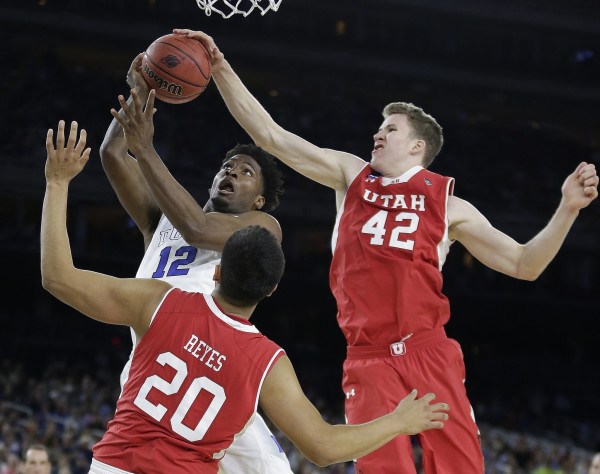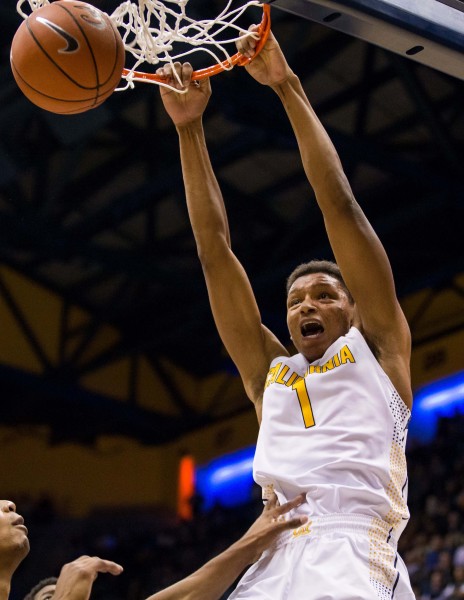Handing Out Pac-12 Superlatives
Posted by Mike Lemaire (@Mike_Lemaire) & Andrew Murawa (@Amurawa) on March 8th, 2016With another Pac-12 season now in the books, it’s time to put a bow on the regular season before we all head to the various pool parties and blackjack tables in Vegas (cue Bill Walton: “Please. Las Vegas!). Let’s hand out all the traditional awards below, listing the top candidates followed by the rationale for our picks. Let’s get right to it.
Player of the Year
- Ryan Anderson, Sr, Arizona: 15.8 PPG, 10.2 RPG, 118.5 ORtg, 24.8% of possessions, 56.9 eFG%
- Dillon Brooks, Soph, Oregon: 16.7 PPG, 5.6 RPG, 3.1 APG, 1.2 SPG, 111.5 ORtg, 26.3% of poss, 51.4 eFG%
- Gary Payton II, Sr, Oregon State: 15.9 PPG, 7.6 RPG, 5.3 APG, 2.4 SPG, 111.5 ORtg, 27.0% of poss, 50.8 eFG%
- Jakob Poeltl, Soph, Utah: 17.5 PPG, 9.1 RPG, 1.9 APG, 1.6 BPG, 127.1 ORtg, 25.9% of poss, 65.3 eFG%
- Josh Scott, Sr, Colorado: 16.5 PPG, 8.7 RPG, 1.8 APG, 1.7 BPG, 121.5 ORtg, 23.5% of poss, 53.6 eFG%

Jakob Poeltl’s Excellence At Both Ends Of The Court Makes Him The Clear Cut Pac-12 POY (Charlie Riedel, AP)
Andrew Murawa: That’s a pretty solid five-man first team (with guys like Jaylen Brown, Andrew Andrews and Chris Boucher also having arguments for inclusion). But there is one player from this group who stands above the rest, as Jakob Poeltl has been the best offensive player in this conference, ranks among the handful of best defensive players, and has been a rock in leading the Utes to a second-place finish.
Mike Lemaire: My heart wants to pick Gary Payton II, but my head knows the right pick here is Poeltl. The big man has put together a season that rivals that of any Pac center in the past two decades. He is among the league leaders in nearly every statistical category and is the focal point of the Utes’ game plan on both ends of the floor. It isn’t a coincidence that Poeltl is playing his best basketball of the season as Utah has gotten hot.
Coach of the Year
- Dana Altman, Oregon: 25-6, 14-4
- Larry Krystkowiak, Utah: 24-7, 13-5
- Cuonzo Martin, California: 22-9, 12-6
- Sean Miller, Arizona: 24-7, 12-6
AM: Last year, Dana Altman received the official Pac-12 COY award in somewhat controversial (hey, Tucson) fashion, earning the nod over Sean Miller despite finishing behind him in the standings. This year, arguments can be made for any of the four coaches at the top of the league, but this award should belong to Altman. While yours truly has ranked Oregon as the Best in the West since August, the Ducks were picked fourth by the media. And that was before would-be senior point guard Dylan Ennis missed all but 21 minutes this season because of a foot injury. Altman patched together a seven-man rotation from disparate sources and coached them up to become the best team in the conference. Winning 14 games in such a competitive league this season is commendable.
ML: There are many different ways to evaluate Coach of the Year, but I prefer to pick one based on how his team performed relative to expectations. Parity in the conference meant there was no such coach this season, so, with apologies to Lorenzo Romar, this award should go to the coach of the best team: Dana Altman. He is the architect of one of the better two-way teams in the country and has done so while breaking in a new starting lineup. He is both the most deserving and a semi-obvious choice.
Freshman of the Year
- Jaylen Brown, California: 15.3 PPG, 5.6 RPG, 1.9 APG, 98.5 ORtg, 31.0% of possessions, 49.4 eFG%
- Tyler Dorsey, Oregon: 13.2 PPG, 4.3 RPG, 2.1 APG, 109.1 ORtg, 21.9% of poss, 54.5 eFG%
- Dejounte Murray, Washington: 15.3 PPG, 5.8 RPG, 4.3 APG, 1.8 SPG, 95.9 ORtg, 25.7% of poss ,44.6 eFG%,
- Ivan Rabb, California: 12.2 PPG, 8.4 RPG, 1.2 BPG, 120 ORtg, 20.7% of poss, 60.7 eFG%
- Allonzo Trier, Arizona: 14.6 PPG, 3.4 RPG, 1.1 APG, 114.0 ORtg, 22.8% of poss, 53.9 eFG%
AM: This is a strong all-freshman team, but there’s no clear front-runner for the Freshman of the Year award. Jaylen Brown has turned it on down the stretch and is playing as well defensively as anyone, but he remains an unpolished offensive player. His teammate, Ivan Rabb, has been more consistent at both ends of the floor, but will never have the high usage numbers of Brown. Trier is the other most deserving candidate, as his attacking offensive style is the fulcrum of Arizona’s fortune every night out. Dorsey is just one of many excellent players on his own team, and, while Murray was spectacular at times, he was too inefficient and inconsistent. In the end, this is a full-season award and therefore it has been Rabb who has been the most consistently impactful freshman for his team. He kicked off his career with a double-double, turned in nine more of those over the course of the year, and has been a key cog in turning the Golden Bears into the conference’s best defensive unit.
ML: Rabb is the more efficient player and has indeed been more consistent, but Jaylen Brown has proven over the last two weeks that Cal goes as he goes. Simply put, the top-five recruit is the most important player on that team. Brown is still learning how to play within a cohesive system and his shooting is still a work in progress, but his athleticism alone makes him a one-man defensive wrecking crew. Furthermore, his ability to create for himself means he often ends up creating for others too. Rabb is a stud and also deserving of the award, but Brown’s irreplaceability gives him the nod.

Ivan Rabb May Not Have The Flash Of His Teammate Jaylen Brown, But He’s Been Rock-Solid For Cal (John Hefti-USA TODAY Sports)
Defensive Player of the Year
- Chris Boucher, Sr, Oregon
- Gary Payton II, Sr, Oregon State
- Jakob Poeltl, Soph, Utah
AM: Going into the final Saturday of the regular season, I had narrowed my candidates for this award down to the above three players (although Jaylen Brown, Josh Scott and Kadeem Allen also deserve mention). Boucher’s shot-blocking and ability to defend smaller players away from the hoop are a dangerous combination. Poeltl’s a terrific shot-blocker himself and an equally good defender both in the post and in the pick-and-roll. And while Oregon State’s defense took a step back this season, Gary Payton II’s individual defense has been everything you could want from a defending DPOY. Call it recency bias or a sucker for the dramatic, but Payton’s steal leading to the game-sealing (and possibly NCAA Tourney-bid-clinching) windmill dunk was my decision point. If you ask me, Payton put together two spectacular seasons in Corvallis that are deserving of two Pac-12 Defensive Player of the Year awards.
ML: Boucher might be one of the best shot-blockers in the country but he isn’t the all-around defensive menace of GPI. He has size at 6’3” to swallow opposing point guards whole while also handling bigger guards and wings. He is one of the best pound-for-pound rebounders in the country and is so active with his hands that he can’t help but create turnovers. Boucher is a game-changing defensive player in his own right, but Payton is the reigning Defensive Conference Player of the Year for a reason. His numbers may not be as impressive this year, but he has done nothing to lose the honor either.
Most Improved Player
- Rosco Allen, Sr, Stanford: 15.7 PPG, 6.3 RPG, 1.7 APG, 1.2 SPG, 109.9 ORtg, 23.3% of poss, 51.3 eFG%
- Tra Holder, Soph, Arizona State: 14.3 PPG, 3.5 RPG, 3.5 APG, 1.0 SPG, 100.7 ORtg, 25.6% of poss, 45.6 eFG%
- George King, Soph, Colorado: 13.3 PPG, 4.8 RPG, 109.4 ORtg, 23.8% of poss, 55.0 eFG%
- Jordan McLaughlin, Soph, USC: 12.9 PPG, 4.9 APG, 3.7 RPG, 1.6 SPG, 111.7 ORtg, 20.7% of poss, 54.9 eFG%
- Gabe York, Sr, Arizona: 15.0 PPG, 3.3 RPG, 2.4 APG, 111.9 ORtg, 21.2% of poss, 54.2 eFG%
AM: The nature of college basketball requires plenty of improvement among players from year to year. As one senior graduates and leaves a void of production, a returnee must step up for him. That makes it difficult to narrow these things down. Conference Player of the Year Jakob Poeltl, for example, made huge strides over his performance last year, while others like Julian Jacobs, Isaac Hamilton, Michael Humphrey and Jabari Bird should also be recognized for their improvement. Even the quintet we narrowed this down to above features a variety of fellows who exhibited their improvement in different ways. York, for instance, had been a quality reserve on three consecutive NCAA Tournament teams, but he stepped into a more high-usage role in his final season in the desert. Allen, likewise, was a familiar name who was asked to do far more in his final season. Holder and McLaughlin, on the other hand, were the typical sophomores making a big leap once they started to figure the game out. But our pick for Most Improved Player goes to George King who, after averaging just 1.5 PPG on 5.5 MPG two years ago exploded back onto the scene after a redshirt year, becoming Colorado’s second-leading scorer and best three-point threat.
ML: In honor of his effort this season, it’s important that Andrew Andrews gets some sort of official recognition for carrying the Baby Huskies nearly every step of the way this season. The delta between his scoring from last season to this is the most obvious place of improvement, but Andrews also doubled his assist rate and got to the free throw line more often than anyone in the league. He did all of this as the only upperclassman on a team full of players who would foul the water bottle if it drove to the hoop and wouldn’t know a high-percentage jump shot even if they were playing 5-on-3. The Huskies are going to be really good. This year they weren’t… except for Andrews.










































